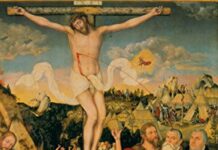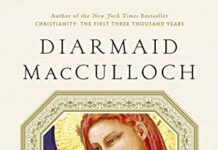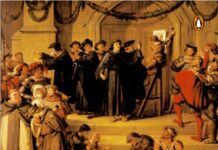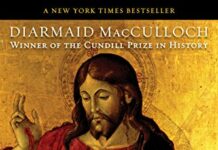
Ebook Info
- Published: 2018
- Number of pages: 752 pages
- Format: PDF
- File Size: 70.18 MB
- Authors: Diarmaid MacCulloch
Description
The long-awaited biography of the genius who masterminded Henry VIII’s bloody revolution in the English government, which reveals at last Cromwell’s role in the downfall of Anne Boleyn”This a book that – and it’s not often you can say this – we have been awaiting for four hundred years.” –Hilary Mantel, author of Wolf HallSince the sixteenth century we have been fascinated by Henry VIII and the man who stood beside him, guiding him, enriching him, and enduring the king’s insatiable appetites and violent outbursts until Henry ordered his beheading in July 1540. After a decade of sleuthing in the royal archives, Diarmaid MacCulloch has emerged with a tantalizing new understanding of Henry’s mercurial chief minister, the inscrutable and utterly compelling Thomas Cromwell.History has not been kind to the son of a Putney brewer who became the architect of England’s split with Rome. Where past biographies portrayed him as a scheming operator with blood on his hands, Hilary Mantel reimagined him as a far more sympathetic figure buffered by the whims of his master. So which was he–the villain of history or the victim of her creation? MacCulloch sifted through letters and court records for answers and found Cromwell’s fingerprints on some of the most transformative decisions of Henry’s turbulent reign. But he also found Cromwell the man, an administrative genius, rescuing him from myth and slander. The real Cromwell was a deeply loving father who took his biggest risks to secure the future of his son, Gregory. He was also a man of faith and a quiet revolutionary. In the end, he could not appease or control the man whose humors were so violent and unpredictable. But he made his mark on England, setting her on the path to religious awakening and indelibly transforming the system of government of the English-speaking world.
User’s Reviews
Reviews from Amazon users which were colected at the time this book was published on the website:
⭐Cromwell is the same authentic history and good writing we expect from Diarmaid McCollugh. This book is very well researched and completely documented. Another valuable work from an outstanding writer.
⭐This learned, readable biography is really four books. It is a history of the years from 1528 to 1540, the start of the English Reformation; it is a Who’s Who for the regime of Henry VIII; it is a masterclass in Tudor history, with a veteran researcher carefully handing documents across the seminar table. And it is the story of Thomas Cromwell, Henry VIII’s loyal, able, amoral right-hand man.In Hilary Mantel’s Wolf Hall and Bring Up the Bodies, splendid historical novels which Diarmaid MacCulloch compliments, Thomas Cromwell was a bold, attractive figure. (“He can draft a contract,” Mantel wrote, “train a falcon, draw a map, stop a street fight, furnish a house and fix a jury . . . He knows new poetry and can say it in Italian”—and, on-screen, Mark Rylance has played Cromwell as memorably as Paul Scofield played Sir Thomas More.) In this biography, Cromwell shows the same qualities, but they are clouded by a courtier’s ruthlessness and a fixer’s lack of scruple.MacCulloch’s 1996 biography of Henry VIII’s other great servant, Archbishop of Canterbury Thomas Cranmer, drew eloquently on a wealth of records, memoirs, and correspondence. For Cromwell, the record is sparer. His early life must be reconstructed from stray lines in friends’ letters and a long, laudatory entry in Foxe’s Book of Martyrs. His loyalty to Cardinal Wolsey is reflected in the coat-of-arms he chose, which borrowed from the Cardinal’s escutcheon. A host of records survive from his work in crushing the English monasteries, fewer from his last years in power. Many of his outgoing letters have vanished—quietly removed by loyal clerks who feared their master’s words would be turned against him, Macculloch believes.Cromwell was a diligent servant of the crown—often more forward than his royal master knew. Covertly, he fostered the Protestant faith. “In effect he used Archbishop Cranmer as a front-man to create permanent links with Zürich. That Reformed city-state, leader of Swiss evangelical expansion, symbolized everything his master Henry VIII loathed most in the Reformations across the Channel, and yet Cromwell persisted in the project. Indeed, to this we can add Vice-Gerent Cromwell’s steady official promotion in the 1530s of a vernacular Bible, the text of which was largely from William Tyndale, the man at whose murder the King had connived and whom he never forgave for heresy . . . . In all these cases, Cromwell for a while got away with the sleight of hand.”As late as the spring of 1540, Cromwell was sending his foes to the Tower. He was managing Parliament skillfully, winning a fresh grant of taxes and passing the landmark Statute of Wills. He held the title, unique in English history, of “Vice-Gerent in Spirituals”: deputy to King Henry as head of the Church of England, with the power to override archbishops. A brewer’s son, he had been raised to the peerage as Earl of Essex. With his own son married to the sister of Elizabeth Seymour, the king’s late wife, he counted as something like the king’s uncle.That spring, Cromwell made a fatal error. With an aide he thought he could trust, he shared a dangerous confidence: that Henry had not consummated his marriage to his new German wife, Anne of Cleves. The Vice-Gerent’s desperate enemies engineered a reversal of fortune. They persuaded Henry that Cromwell had gossiped about the king’s impotence—a treasonous utterance, and an insult that the enraged king would not forgive. On June 10, Cromwell was arrested at a Privy Council meeting; on July 28 he went to the scaffold.The king regretted this. Within a few months, he upbraided his counselors, objecting that by their false accusations, over trivial matters, “he had been made to put to death the most faithful servant he ever had.” “Self-pity has a talent for rewriting events,” MacCulloch observes. But there was a bleak truth to the king’s complaint.Novelists are free to envision and suggest. The historian must give the footnotes. This is a historian’s book, in every sense of the word, and a fine one. MacCulloch has gone through the Tudor archives and pulled out what matters.From my review in The Phi Beta Kappa Key Reporter
⭐I’m in the midst of reading this book and like his other book that was a one year study (using his book), he is very detailed in his writing. I love religious History, so I’m very much enjoying this read.
⭐The author is careful not to invent or over speculate. This is a professional historian’s presenttion of a complex man and a complex situation. I am aware that Thomas Cromwell’s place in Tudor government is debated, but this seems to be a measured account. I do feel that Cromwell may have fallen into the same trap that Thomas Wolsey fell into. Both seem to have forgoten, “their place.” Even today, in our substantially less hierarchical society, it is usually foolish to do an end run around your boss and advance your own policy. Advocating is one thing, going ahead without permission is quite another. In a way both of these men were, at times, actively sabotaging the king (Henry VIII). The book is nicely written and the lines of presentation easy to follow. While this is not a popular history, an attentive reader should have no difficulty. — JRG
⭐I can authoritatively add little to what several thoughtful reviewers have written. McCullough’s research is as deep and broad as anyone could hope, much less expect. The writing and diction are as at high a level as I’ve read anywhere. One finds many wonderful turns of phrase throughout but few memorable or beautiful sentences. T McCullough’s vocabulary is precise, well-honed, a quality I very much admire, though I suspect that many will find themselves resorting to a good dictionary to get a full sense of a given word’s meaning. Certainly, I did.One reviewer comments difficulty in accessing the endnotes in the printed, bound edition, with which I began. I soon purchased the Kindle edition, primarily because of the printed edition’s ungainliness. Besides resolving that issue, it also deals nicely with the endnote issue, for tapping on the note number brings up the note on the page one is reading, and tapping on the page returns one to the body text. McCullough and Mantell clearly respect one another, at least given their printed comments regarding the other, and Mantell has expressed admiration for the six-part television adaptation of her novels, Wolf Hall. I am grateful for Mantell’s novels and their adaptation, but McCullough’s excruciatingly detailed account of Cromwell’s actions and strategies provides substantial reason to rethink Mantell’s compelling but romanticized account, not to mention the television adaptation.On balance, however, McCullough’s book has given me much more insight into the machinations by which Anglican Christianity came about than into the life and character of Cromwell. I do not intend the foregoing to be a criticism of Diarmaid’s magisterial effort but an affirmation of the view that, after all, Cromwell might not be biographable. Indeed, my present sense is that this volume is more an account of a crucial period of British history than the biography of a man.This book requires dedication and effort. Giving it both is worth the while.
⭐Got it day of release, took it and read it on a half term holiday in Cyprus. So first thing to say, is it’s a big old tome, you won’t need any sun cream on your chest if you read it by the pool that’s for sure!So, who is it suitable for? It has an academic focus – consistent engagement with the primary sources, addressing the controversies of the time (e.g., extent to which TC was driven by religious belief or plain opportunism) and because of this, some may find it tougher to get into. Others, and I fall into this camp, will be very pleased. This is not flashy, narrative history, although the story is there, but thoughtful analysis, providing an understanding of the boundaries and limits of our ability to know what actually happened.It is also particularly good on the relationship between Anne Boleyn & TC…debunking the idea that they were allies and showing the complexity of the situation.I think overall, in terms of being for or against TC, it is quite ‘warts and all’ (the book can’t resist using this phrase either..) and well balanced.I also liked how it deals with the fact that many readers will have preconceived ideas about TC because of his place in popular culture – specifically because of the Mantel books. It debunks many of the inaccuracies.So, in summary an excellent and well balanced addition to Tudor history.
⭐In many ways, this is an excellent history of Thomas Cromwell’s place in the history of the church and religion in the 1520s and 1530s. It has been meticulously researched and is highly convincing. Admittedly, it is unnecessarily long and contains far too much, rather boring, detail. But the author has done fine job.The only trouble is that the political and governmental biography of Thomas Cromwell is peripheral to the author’s main interests which is ecclesiastical history. So, each chapter is full of references to Cromwell’s role as an evangelical reformer and the broader picture is quite thin and lost in the never-ending references to religious history.So, in the end, I was disappointed and, in places, somewhat irritated.
⭐I came to this book, like so many others, because of Hilary Mantel’s novels about Cromwell, and also because I’ve seen several television documentaries by Diarmaid MacCulloch, where he is always clear, interesting, humorous, obviously very knowledgeable, and doesn’t talk down to the viewer – one of the very best history presenters on present-day TV. As a consumer of this kind of information, but as someone with no formal historical training, I wanted to find out what Thomas Cromwell was “really like”.Well, you certainly learn a lot about Cromwell from this book, which as a non-historian I would say is an evidence-based chronicle of his public life (almost entirely) and his effect on the very turbulent times in which he lived. Clearly MacCulloch knows a tremendous amount about his subject and has gone to the source documents to back up almost all the things he says. It is clear that the book is a major achievement by a serious scholar (and probably for other scholars contains a good deal of revisionist thinking, which of course passed me by completely.)There is a lot (an enormous amount, in fact) of very fine detail, which I personally found very difficult to follow – simply remembering the names and relationships of the enormous cast of characters was for me pretty overwhelming. MacCulloch’s humour is not lacking, though often quite buried, sometimes emerging into the light, as in his discussion of the 10 Commandments; but in the end my ambition to read the book like a novel, where one remembers the plot as the narrative goes on, defeated me. Of course through the book one understands the outline of his career but very many of his activities just get lost in the detail. Perhaps it was silly of me to want to read the book in this way, so I can’t blame MacCulloch for my feeling of inadequacy.Another key problem for me was the context: most of the book is about ecclesiastical shenanigans of one kind and another. It is plain from the book that the church in Britain since the Middle Ages (or even earlier) had become a very complex and very corrupt organisation, with abuses like absentee priests, money moving around in distinctly un-Christian ways, jobs and property being handed out for totally secular reasons, appalling punishments like burning being somehow thought of as being compatible with biblical teaching, actual pastoral care being a low priority for many priests, etc. Although the monasteries disappeared during Cromwell’s time, the church’s enormous spider’s web of privilege, influence and corruption on the whole (it seems) stayed intact. For me, MacCulloch just didn’t go out of his way to explain this monster enough – it was great when he explained friaries, but that was an exception to his general assumption that his reader would understand the lie of the Christian land that Cromwell had to deal with – at least it looked that way to me.Lastly, I was surprised how little was said about ordinary people: MacCulloch shows that Cromwell’s origins were not really as humble as Mantel suggests in her novels: nevertheless Cromwell must have been quite near the bottom of society at some points. We hear about his “servants” for example, but these aren’t his groom, butler and chambermaid, but generally quite posh and well-educated agents and employees – we don’t really see into his household at all, or get much of an idea what his life was like outside the office, as it were. Maybe Mantel just had to make that part up because of the lack of documentary evidence.Anyway, did I find out what Cromwell was really like? I would say dimly, rather than vividly. Perhaps that’s why people read novels.So, my recommendation to non-historians is to read it slowly, make notes, and if you have the time (I don’t think I have, myself), refer to other books which will give you more context about social and church life in sixteenth century Britain.
⭐Who really was this man? I studied him in depth, I thought, when writing a novel ‘The Woman in the Shadows’ inspired by his wife and whilst writing this novel I realized by the 1520s Cromwell was most likely a closet evangelical, ambitious and pragmatic. I wish I had read this biography then. It is a considered, exquisitely researched and wonderful biography that shows delightful flashes of dry humour. I am stunned by Diarmaid McCulloch’s investigation which is ‘in depth’ and his analysis which is solidly supported and penetrating. All the players that touched Cromwell’s life haunt this book’s pages and are vividly described, both enemies and friends. Historical Biography is very different from recreating these personalities for a novel. Biographies can be dry. This one is not that but it is intellectual and very erudite. Once I appreciated its style I was captivated by it. It certainly ought to win prizes. I am so pleased to have read it. Cromwell is not excused here but he’s explained within the scope of the climbing the greasy pole at the Tudor Court, his work for Thomas Wolsey ( Thomas Wolsey himself is well-analyzed here which is very important if one is to understand in part some of Cromwell’s motivations). We come to see a King who is changeable and obsessed, factions at court and importantly New Learning and an emergent English Reformation. This last, Cromwell’s involvement with evangelicals is important as he becomes less pragmatic and more confident. Eventually, see Cromwell struggling to survive and we understand his ‘bad-luck’ after the mistake with the Cleves marriage as well as the hawks in the background waiting to bring him down. Simply Cromwell was human and there are many parts to a man. I was thrilled to see him explained so fully in this superb biography. Even so, Thomas Cromwell remains an enigmatic personality.
⭐I suspect this book will become the premier biographical work from the pen of Diarmaid MacCulloch. Which in some ways I regret, as for me, although his biography of Cromwell is a better read, the subject of his earlier biography (Thomas Cranmer) was even more interesting and the representation of Cranmer is, I suspect, more honestly sympathetic than MacCulloch’s representation of Cromwell.The reason I believe that ‘Thomas Cromwell: A life’ will transcend any other MacCulloch biography owes much to Hilary Mantell’s elegant portrayal of a fictional Cromwell that has captured the popular imagination. Making the subject of this biography far more popular than the other reformation icons in the MacCulloch niche. Mantell points out on the flyleaf of ‘Thomas Cromwell: A Life’ that this is the most comprehensive biography of her hero that has yet been produced. A generous complement given that MacCulloch’s Cromwell differs greatly from Mantell’s, albeit with one defining feature in common: they are both master tacticians and political manipulators in the name of the reformed church.MacCulloch portrays Cromwell in far more detail, although less intimately and somewhat more ambiguously than he was portrayed in Wolf Hall, as would be expected from a biography in comparison with a novel. For me MacCulloch’s Cromwell is also a far less sympathetic character, although equally heroic. A position given to him at the expense of a somewhat hapless Henry Tudor: Cromwell is given credit for all the vision and planning. Which in my opinion is a little unfair on both Cromwell and Henry. Henry was by all accounts psychotic, but probably not as easily manipulated as MacCulloch would have us believe. Thus, perhaps, Cromwell was at times more the tool than the driver of events and so deserves a little less of the credit and a little less of the blame.In MacCulloch’s earlier Tudor biography, the eponymous Cranmer hogs the limelight, in this later work Cranmer is (of course) a bit player, but nevertheless even in what may prove to be Cromwell’s definitive biography, the politician comes across as a far more unpleasant character than the Archbishop. This is despite some quite blatant spinning in Cromwell’s favour.MacCulloch is always meticulous in use of his sources, but thankfully is not beyond extrapolation. At such a distance in time and in the study of per force private beliefs of politically vulnerable people, it is impossible to know with certainty what the protagonists in this book really thought and therefore it is necessary to make certain assumptions. It would make for a very tedious read if each contention came with a disclaimer that ‘clearly this is only a possibility’. One such contention presented as a fact, is that Cranmer was a Nicodemite. MacCulloch uses this term in the sense of an Italian religious movement (on a par with Calvinism or Lutheranism). I am not so sure that anyone ever self-identified as a Nicodemite and I feel that surreptitious evangelism was always more a pragmatic response to oppression rather than a coherent reformist movement.MacCulloch is not the first to label Cromwell as a Nicodemite, but he is unusual in doing so in a positive way: using the label to excuse Cromwell for his very evident dissimulation in the face of pressure from powerful patrons, first Wolsey and then Henry. Another interpretation is that Cromwell never really had highly principled religious beliefs and was more interested in power, albeit leaning towards an evangelical position, perhaps influenced more by Cranmer than the other way around. This interpretation sits awkwardly with McCulloch’s wish to emphasize the positive elements of the Anglican tradition and distance it from the more unattractive elements associated with Henry VIII, much easier to represent Cromwell as heroically trying to steer the nascent church in its eventual course than to admit that Anglican doctrine was the product of evolution rather than intelligent design.Cromwell the arch politician, conspiring and working in the shadows is a familiar figure. The distinctive element of MacCulloch’s presentation of the man is the genuine loyalty to Cardinal Wolsey and the consequent depth of animosity towards Anne Boleyn. MacCulloch convincingly shows that Cromwell was probably the driving force behind Anne’s downfall, motivated by revenge for his previous patron, disagreements with Anne regarding foreign policy (he leaned towards the empire of Charles V while she leaned in the other direction towards France) and finally (according to MacCulloch) religious disagreements, with Anne taking a more conciliatory position towards the monasteries. The last of these is the least convincing for me, I think the disagreement may well have been real, but I am not sure this was so important for Cromwell the politician and I believe Cromwell was far more politician than reformer.The idea that Cromwell was genuinely and consistently faithful to the (basically) traditionalist Wolsey is well presented and credible. I am convinced and I believe this is a major factor in the downfall of Anne Boleyn. I would argue that this contradicts another basic tenet of MacCulloch’s book; that Cromwell was a convinced and ardent reformer from the start and worked behind the scenes to manipulate Henry VIII towards an English Reformation. I would argue that MacCulloch’s own research brings this into question and suggests the drivers of the Reformation were Cranmer (for purely ideological reasons) and Henry (largely for political motives but also from genuine belief). Cromwell in this scenario was merely a willing facilitator and ultimately a fall guy.Elizabeth I is also labelled as a Nicodemite by MacCulloch, in the image of her mother’s nemesis. While it is undoubtedly true that both Elizabeth and Cromwell had periods when frank and open declaration of their religious beliefs would have been a potentially fatal error I suspect Cromwell would have extended his dissimulation to the grave and died happily if his more secular goals had been met. My suspicion is therefore that Elizabeth was actually the more strategic player in support of her faith (a true Nicodemite), but this is only a suspicion.
Keywords
Free Download Thomas Cromwell: A Revolutionary Life in PDF format
Thomas Cromwell: A Revolutionary Life PDF Free Download
Download Thomas Cromwell: A Revolutionary Life 2018 PDF Free
Thomas Cromwell: A Revolutionary Life 2018 PDF Free Download
Download Thomas Cromwell: A Revolutionary Life PDF
Free Download Ebook Thomas Cromwell: A Revolutionary Life





